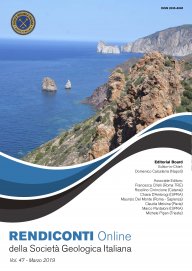
Urban groundwater warming in Turin area (NW Italy)
Arianna Bucci (a), Diego Barbero (b), Manuela Lasagna (c), Maria Gabriella Forno (c) & Domenico Antonio De Luca (c)
(a) Geodata Engineering S.p.A. Corso Bolzano 14 10121 Turin (Italy).
(b) Freelance Geologist.
(c) Department of Earth Sciences, University of Turin, via Valperga Caluso, 35, 10125, Turin, Italy.
Corresponding author e-mail: arianna.bucci@unito.it
Volume: 47/2019
Pages: 2-6
Abstract
This study investigated the thermal regime of shallow groundwater in the Turin area (NW Italy), where the large energy demand has driven a new interest for ground-source heat pumps (GSHPs). The strongest vertical variability of groundwater temperature is found within 10-20 m below ground surface. In spring, deeper temperatures are higher than shallow temperatures, while in autumn the trend is reversed. These variations are connected with the heating and cooling cycles
of the ground surface due to seasonal air temperature oscillation, propagating into the aquifer.
The areal temperature distribution shows an increase from the foothill sectors close to the Alps towards the central Po Plain, driven by the progressive warming along the flow path. In the Turin city aquifer temperatures are 0.6 ÷1.6 °C higher than rural sectors. This groundwater warming is linked to the urban heat island effect, mainly driven by the typical artificial land use. Sparse warmer outliers (16-20
°C) are in some cases connected to documented point heat sources, such as GSHP systems, industrial districts and landfills.
Keywords
groundwater temperature, seasonal oscillation, anthropogenic heat sources, ground-source heat pumps.
Get Full Text